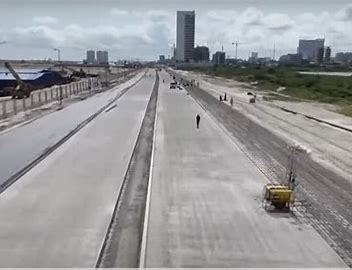
Nigeria’s Minister of Works, Senator Dave Umahi, made the official announcement on Thursday during a meeting in Lagos with community representatives residing along the road alignment, specifically between Eko Atlantic (Chainage Zero) and Eleko inside (Chainage 47.4klm).
Umahi specified that section three will initiate from Calabar, while section four will commence from Akwa Ibom.
Umahi said, “Let me announce also that Mr President has directed that section three that is starting from Calabar and section four that is starting from Akwa Ibom should commence immediately; and so, we are in the process of concluding the procurement.
And for those who have been saying why not start these roads in Calabar, one, the zero point is Lagos, and what wrong has Lagos done to these people?
“However, an impartial President of the Federal Republic of Nigeria, Sen. Bola Tinubu, has directed that sections three and four be started from the end of the project. So, while this is moving, the other one will be moving.
“I’m sure that sections five and six will also start in places like Port Harcourt and Bayelsa.”
Umahi further declared that the president had authorized the initiation of construction on the thoroughfare linking Sokoto to Badagry.
He said President Tinubu also sanctioned an additional undertaking during the most recent Federal Executive Committee gathering held on Monday.
“It’s a 1,000 km, it’s running through a lot of irrigation, lands and dams where you can have a lot of power generation and its running from Sokoto to Kebbi, Kebbi to Niger, Niger to Kwara, Kwara to Oyo, Oyo to Ogun state, and then to Badagry in Lagos State,” the Minister noted.
Umahi acknowledged the potential criticism regarding the scale and selected sections of the project, emphasizing that the 47.7 kilometers of section one was indeed ambitious for an interstate road project.
He elaborated that the federal government’s strategy involved recovering construction expenses through tolling and the sale of land adjacent to the road corridors.
As he stated, the primary objective is to establish a picturesque route similar to coastal highways in other nations.
Furthermore, he emphasized that the return on investment would commence immediately upon the completion of the initial section, with revenue generated from tolls and land sales along section one.
The minister highlighted the financial losses incurred daily by the country due to cargo transhipment at Apapa Port.
He clarified that the inadequate water depth at Apapa Port hindered large ships, compelling them to utilize deeper ports elsewhere for cargo transshipment, resulting in substantial financial losses on a daily basis.
He also mentioned that the new roads would serve as an evacuation route for the Lekki Deep Sea Port to connect with other regions of the country.
The Federal Inland Revenue Service (FIRS) has begun its recruitment exercise for experienced professionals to…
Primate Elijah Ayodele Unveils 94-Page Prophecy for 2025, Makes Striking Predictions About Nigeria’s Political and…
The Senior Special Assistant to President Bola Tinubu on Community Engagement (North Central), Abiodun Essiet,…
The Minister of Information and National Orientation, Mohammed Idris, has warned politicians against linking stampedes…
Tobi Adegboyega, founder of the Salvation Proclaimers Anointed Church (SPAC Nation), has stated that he…
The Independent Petroleum Marketers Association of Nigeria has said that petrol is going to sell…